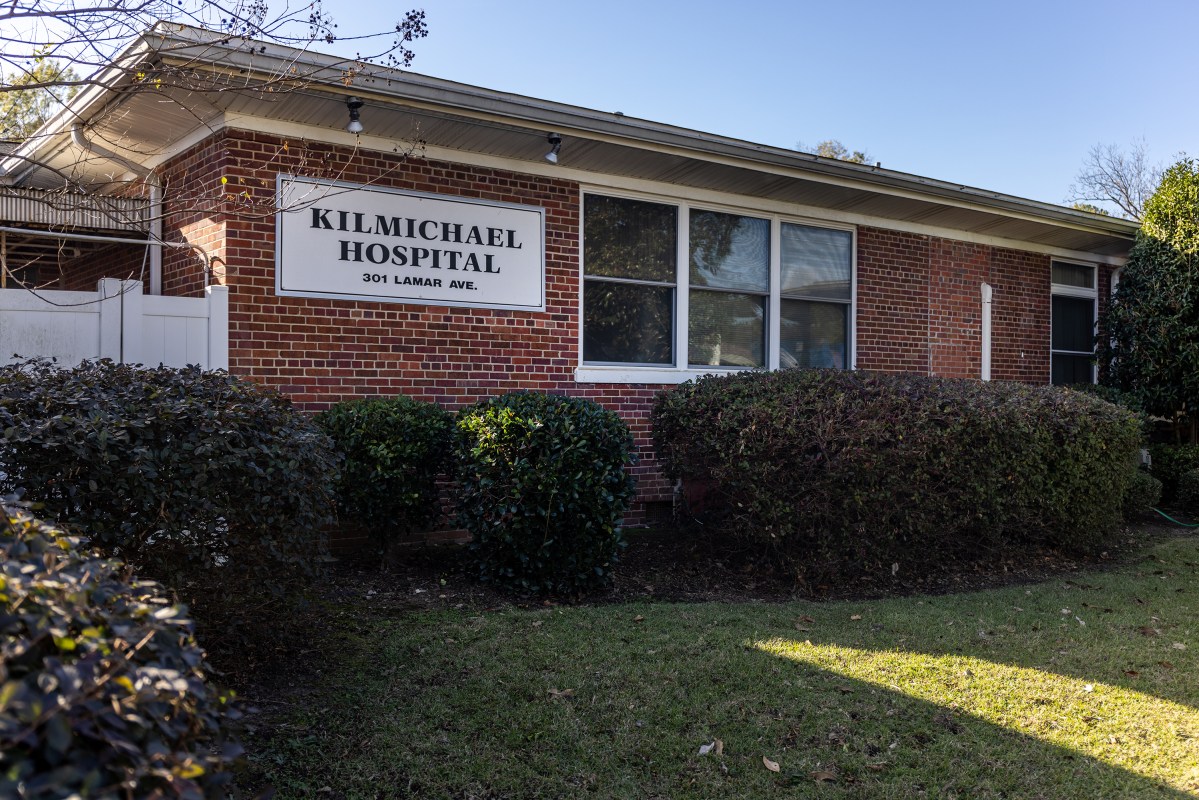Mississippi Today
‘What’s your plan, watch Rome burn?’: Politicians continue to reject solution to growing hospital crisis
‘What’s your plan, watch Rome burn?’: Politicians continue to reject solution to growing hospital crisis
Note: This article is part of Mississippi Today’s ongoing Mississippi Health Care Crisis project.Read more about the project by clicking here.
Mississippi's only burn center has closed. The Delta's only neonatal intensive care unit has closed. A Jackson hospital that serves vulnerable populations is gutting key services to balance its budget. One of the state's largest hospitals is months, if not weeks, from shutting its doors for good.
Mississippi hospitals are in crisis, struggling to keep up with rising industry costs and cover care for the sixth-most uninsured population in America. Six hospitals have closed across the state since 2005, and countless more have reduced services and staff.
Even more sobering, the state's top health care leaders warn that a dozen more hospitals across the state are in imminent danger of closing.
“Things are getting worse, not better,” Dr. Dan Edney, the state’s health officer, said in an October Board of Health meeting. “We know of 10-12 hospitals statewide that may not even be here one year from now … Those of us who are watching this in health care leadership statewide have a lot of concern.”
As the Mississippi health care crisis worsens, the state's political leaders are facing growing pressure from health care professionals to do something they've refused for 12 years: expand Medicaid. Doing so, as 38 states have done, would provide immediate financial relief to the state's hospitals that are struggling to stay alive, countless economic and health care experts have said.
About 12% of Mississippians are uninsured, leaving hospitals with little to no way to recoup the costs of care administered to some of the nation’s poorest and unhealthiest patients. Hospitals are required to provide life-saving care to everyone, regardless of whether they’re insured. In many cases, those costs are bringing hospitals — including Greenwood Leflore Hospital in the Mississippi Delta — to the brink of closing.
Studies, including one from the state economist, have shown Medicaid expansion would provide health care coverage for at least 200,000 primarily working Mississippians who don’t currently have it. More than $1 billion per year would flow to the state after expansion, and hospitals would directly receive hundreds of millions to cover rising costs. The study also showed Medicaid expansion would create more than 11,000 jobs per year from 2022 to 2027.
READ MORE: Mississippi leaving more than $1 billion per year on table by rejecting Medicaid expansion
"When you have major hospital systems in this state that have lost a quarter billion dollars last year, hospitals that have never had losses having them now and others budgeting for major losses for next year — the number of hospitals close to the brink is the most it's ever been,” said Tim Moore, president of the Mississippi Hospital Association, an organization that has for years lobbied for Medicaid expansion.
But Gov. Tate Reeves, Speaker of the House Philip Gunn and several powerful political brokers in Jackson have stood firm against even the suggestion of expansion, ignoring the dozens of economic experts who say the state can afford it and that hospitals would be much better off.
“No, I don't support expanding Medicaid in Mississippi,” Reeves told a Mississippi Today reporter last week during a hospital event in Ocean Springs. “I made, very clear, my position when I was running for governor in 2019. What we've got to do in Mississippi is we've got to continue to focus on economic development, job creation, bringing better and higher paying jobs to our state.”
The health care landscape in Mississippi — and nationwide — has changed dramatically since Reeves first made that campaign promise. The stresses of the pandemic widened the cracks in already struggling hospital systems. Labor and supplies costs have surged, making even traditionally profitable hospitals reassess their budgets and services.
Reeves recently pushed legislation giving $246 million in state-funded incentives to a steel mill promising 1,000 new jobs in 10 years. It is private sector jobs, Reeves said, that will most benefit the state’s health care.
“People who work in the private sector that have private insurance have typically far better coverage,” he said.
But the state’s leaders have repeated that refrain for many years, and little has budged with either job creation or health care outcomes. Meanwhile, hospitals across the state are scrambling to make up for lost revenue.
READ MORE: Who’s opposed to Mississippi Medicaid expansion and why?
One of the state’s largest hospitals, North Mississippi Medical Center in Tupelo, is having to manage higher operating costs while caring for uninsured patients. State Sen. Chad McMahan, a Republican who represents the hospital and surrounding area, stops short of advocating for Medicaid expansion. But unlike many of his GOP colleagues in the Legislature, he wants to debate its merits.
The main reason he’s publicly bucked his party leaders, McMahan says: His local hospital would benefit.
“I’ll tell you how large the hospital is,” McMahan told Mississippi Today. “The hospital is so large that if it were to close, we’d have to have seven Toyota-sized manufacturing plants to replace the economic value and salaries (of the hospital), which means it would never happen in our lifetime. Values of homes would drop 15% overnight. You better believe I’m for health care. I’m for health care because it's the right thing to do for Mississippians … It’ll sustain our communities, cities and counties.”
Gulfport Memorial Hospital, another major institution whose CEO is a major political donor to Reeves, reported operating costs going up nearly 18% in 2021. They hit operating losses just shy of $67 million for the last fiscal year.
To Gulfport’s east, the Singing River Health System’s CEO is searching for a larger system to buy its publicly-owned Gulf Coast hospitals. The system is not in dire financial straits, but leadership says they’re trying to be proactive before they hit a crisis point.
In his recent announcement of the tax incentives for the steel mill, Reeves did not mention the 600-plus current jobs that are in jeopardy at Greenwood Leflore Hospital. But the major hospital in the Delta could close imminently, leaders warn. They hoped to strike a deal with the state’s only academic hospital – Jackson’s University of Mississippi Medical Center – but those plans dissolved at the beginning of the month.
Greenwood Leflore leaders are trying to stretch their budget to stay open over the next two months with hopes the Mississippi Legislature will step in to save it. Greenwood Leflore interim CEO Gary Marchand has publicly advocated for Medicaid expansion, saying it would go a long way in helping balance the hospital’s budget.
“What’s your plan: To watch Rome burn and to let hospitals close?” said Dr. Gary Wiltz, a Medicaid advocate and the CEO of a system of 19 of rural health clinics in Louisiana. “It goes back to a fundamental question: is health care a right or a privilege?”
Q&A: What is Medicaid expansion, really?
Pioneer Community Hospital of Newton on Thursday, Nov. 10, 2022. The hospital closed in December 2015.
Merit Health Central, a private hospital in Jackson, has moved or is planning to move its cardiovascular services, neonatal intensive care unit and endoscopy to other locations outside of the city. It already closed its burn center – the only in the state to provide specialized care.
Merit Health Central, formerly Hinds General Hospital, has long been a health care and employment hub in south and west Jackson. Merit Health pointed to “the state’s decision to not expand Medicaid” in addition to labor costs and staffing challenges as to why it is scaling back its operations in a statement to Mississippi Today.
Even Mississippi hospitals that may not be in imminent danger of closing are still facing uncovered costs that are beginning to bleed their budgets dry. Masks, surgical supplies, even food and human resource services have all shot up cost – and that’s on top of the charity treatment hospitals incur costs of for patients too poor to pay for care.
Stan Bulger, who serves on the board of directors at Magee General Hospital, said expanding Medicaid would help to offset revenue losses his hospital incurs for uncompensated care.
"We're losing out on about 15% of the revenue we could collect every month," Bulger said. "We're constantly trying to find ways to make that work, but if you think about it, no business can operate long-term with that much loss. Expanding Medicaid would significantly help us cover that hole, and it could legitimately keep us alive."
UMMC, the state’s only academic hospital, had a $7 million loss in its first fiscal quarter – a loss they predicted as they battled rising nursing costs. The hospital system spent $22 million on staffing temporary nurses to fill gaps. These nurses make about two-and-half times the salaries of those nurses actually employed by the hospital.
Singing River has about 200 positions open. That’s staffing they, too, have to fill with pricier contracted labor. Singing River CEO Tiffany Murdock said she supports Medicaid expansion – and that she agrees any revenue would help hospitals fill gaps.
“If they’re just coming into our hospital with those acute care problems, they are a high dollar,” said Murdock. “With (Medicaid expansion) we’d get reimbursement for that expense that right now…we’re not.”
Increased health care coverage would also likely lead to better patient outcomes. Typically patients without health care go without a primary care doctor, their health problems getting worse – and more expensive – than if they had access to intervening medical care.
 Kilmichael Hospital in Kilmichael on Thursday, Nov. 10, 2022. The hospital closed in January 2015.
Kilmichael Hospital in Kilmichael on Thursday, Nov. 10, 2022. The hospital closed in January 2015.
Wiltz, the Louisiana doctor and CEO of Teche Action Clinic, saw how health care in Louisiana transformed under Medicaid expansion: diabetes patients who risked limb loss with their disease now under control and people with cancerous polyps removed during colonoscopies they would have likely never had without coverage.
As of October of this year, 750,340 people in Louisiana have enrolled in Medicaid expansion. Since 2017, the state health department reported that 84,651 people received colonoscopies that likely wouldn’t have before expansion. Of that, close to 26,000 got polyps removed that could help prevent colon cancer. Another 131,680 got breast cancer screenings.
Wiltz has an easier time balancing his system’s books to secure their future serving rural residents because of the reliable reimbursements form his patients.
“Thank God Louisiana and our governor had enough integrity and compassion to expand Medicaid,” he said. “I really hope that other states – particularly Mississippi – that sees a similar population as we do would come to that same conclusion.”
But in Mississippi, as health care leaders continue to hope Medicaid expansion could soon get a fair debate at the Capitol, they’re having to live with the financial consequences of politics.
“I've been involved in health care in Mississippi since the early 1970s, and this is the worst, by far, of that span in my 50-year career in medicine in this state — both in terms of stability of hospitals, of having enough nurses and doctors and therapists and specialists to staff our hospitals, and in terms of patients having access to care because they're uninsured,” said Dr. Dan Jones, former chief executive of the University of Mississippi Medical Center who has since become the American Heart Association's national volunteer lead for healthcare expansion.
“People dying and hospitals closing are a real consequence of our failure to take advantage of expanding Medicaid.”
Mississippi Today’s Kate Royals, Geoff Pender and Adam Ganucheau contributed to this report.
This article first appeared on Mississippi Today and is republished here under a Creative Commons license.
Mississippi Today
An ad supporting Jenifer Branning finds imaginary liberals on the Mississippi Supreme Court

The Improve Mississippi PAC claims in advertising that the state Supreme Court “is in danger of being dominated by liberal justices” unless Jenifer Branning is elected in Tuesday’s runoff.
Improve Mississippi made the almost laughable claim in both radio commercials and mailers that were sent to homes in the court’s central district, where a runoff election will be held on Tuesday.
Improve Mississippi is an independent, third party political action committee created to aid state Sen. Jenifer Branning of Neshoba County in her efforts to defeat longtime Central District Supreme Court Justice Jim Kitchens of Copiah County.
The PAC should receive an award or at least be considered for an honor for best fiction writing.
At least seven current members of the nine-member Supreme Court would be shocked to know anyone considered them liberal.
It is telling that the ads do not offer any examples of “liberal” Supreme Court opinions issued by the current majority. It is even more telling that there have been no ads by Improve Mississippi or any other group citing the liberal dissenting opinions written or joined by Kitchens.
Granted, it is fair and likely accurate to point out that Branning is more conservative than Kitchens. After all, Branning is considered one of the more conservative members of a supermajority Republican Mississippi Senate.
As a member of the Senate, for example, she voted against removing the Confederate battle emblem from the Mississippi state flag, opposed Medicaid expansion and an equal pay bill for women.
And if she is elected to the state Supreme Court in Tuesday’s runoff election, she might be one of the panel’s more conservative members. But she will be surrounded by a Supreme Court bench full of conservatives.
A look at the history of the members of the Supreme Court might be helpful.
Chief Justice Michael Randolph originally was appointed to the court by Republican Gov. Haley Barbour, who is credited with leading the effort to make the Republican Party dominant in Mississippi. Before Randolph was appointed by Barbour, he served a stint on the National Coal Council — appointed to the post by President Ronald Reagan who is considered an icon in the conservative movement.
Justices James Maxwell, Dawn Beam, David Ishee and Kenneth Griffis were appointed by Republican Gov. Phil Bryant.
Only three members of the current court were not initially appointed to the Supreme Court by conservative Republican governors: Kitchens, Josiah Coleman and Robert Chamberlin. All three got their initial posts on the court by winning elections for full eight-year terms.
But Chamberlin, once a Republican state senator from Southaven, was appointed as a circuit court judge by Barbour before winning his Supreme Court post. And Coleman was endorsed in his election effort by both the Republican Party and by current Republican Gov. Tate Reeves, who also contributed to his campaign.
Only Kitchens earned a spot on the court without either being appointed by a Republican governor or being endorsed by the state Republican Party.
The ninth member of the court is Leslie King, who, like Kitchens, is viewed as not as conservative as the other seven justices. King, former chief judge on the Mississippi Court of Appeals, was originally appointed to the Supreme Court by Barbour, who to his credit made the appointment at least in part to ensure that a Black Mississippian remained on the nine-member court.
It should be noted that Beam was defeated on Nov. 5 by David Sullivan, a Gulf Coast municipal judge who has a local reputation for leaning conservative. Even if Sullivan is less conservative when he takes his new post in January, there still be six justices on the Supreme Court with strong conservative bonafides, not counting what happens in the Branning-Kitchens runoff.
Granted, Kitchens is next in line to serve as chief justice should Randolph, who has been on the court since 2004, step down. The longest tenured justice serves as the chief justice.
But to think that Kitchens as chief justice would be able to exert enough influence to force the other longtime conservative members of the court to start voting as liberals is even more fiction.
This article first appeared on Mississippi Today and is republished here under a Creative Commons license.![]()
Mississippi Today
On this day in 1968


Nov. 24, 1968

Black Panther leader Eldridge Cleaver fled the U.S. to avoid imprisonment on a parole violation. He wrote in “Soul on Ice”: “If a man like Malcolm X could change and repudiate racism, if I myself and other former Muslims can change, if young whites can change, then there is hope for America.”
The Arkansas native began to be incarcerated when he was still in junior high and soon read about Malcolm X. He began writing his own essays, drawing the praise of Norman Mailer and others. That work helped him win parole in 1966. His “Soul on Ice” memoir, written from Folsom state prison, described his journey from selling marijuana to following Malcolm X. The book he wrote became a seminal work in Black literature, and he became a national figure.
Cleaver soon joined the Black Panther Party, serving as the minister of information. After a Panther shootout with police that left him injured, one Panther dead and two officers wounded, he jumped bail and fled the U.S. In 1977, after an unsuccessful suicide attempt, he returned to the U.S. pleaded guilty to a reduced charge of assault and served 1,200 hours of community service.
From that point forward, “Mr. Cleaver metamorphosed into variously a born-again Christian, a follower of the Rev. Sun Myung Moon, a Mormon, a crack cocaine addict, a designer of men’s trousers featuring a codpiece and even, finally, a Republican,” The New York Times wrote in his 1998 obituary. His wife said he was suffering from mental illness and never recovered.
This article first appeared on Mississippi Today and is republished here under a Creative Commons license.![]()
Mississippi Today
On this day in 1867


Nov. 23, 1867

The Louisiana Constitutional Convention, composed of 49 White delegates and 49 Black delegates, met in New Orleans. The new constitution became the first in the state’s history to include a bill of rights.
The document gave property rights to married women, funded public education without segregated schools, provided full citizenship for Black Americans, and eliminated the Black Codes of 1865 and property qualifications for officeholders.
The voters ratified the constitution months later. Despite the document, prejudice and corruption continued to reign in Louisiana, and when Reconstruction ended, the constitution was replaced with one that helped restore the rule of white supremacy.
This article first appeared on Mississippi Today and is republished here under a Creative Commons license.![]()
-

 Kaiser Health News6 days ago
Kaiser Health News6 days agoA Closely Watched Trial Over Idaho’s Near-Total Abortion Ban Continues Tuesday
-

 Local News5 days ago
Local News5 days agoSherral’s Diner to be featured on America’s Best Restaurants
-

 News from the South - Georgia News Feed4 days ago
News from the South - Georgia News Feed4 days agoJose Ibarra found guilty in murder of Laken Riley | FOX 5 News
-

 Local News2 days ago
Local News2 days agoIntroducing our Student Athlete of the Week: Ocean Springs’ very own Mackenzie Smith
-

 News from the South - Alabama News Feed5 days ago
News from the South - Alabama News Feed5 days agoTrial underway for Sheila Agee, the mother accused in deadly Home Depot shooting
-

 News from the South - Kentucky News Feed4 days ago
News from the South - Kentucky News Feed4 days agoNicholasville organization activates weather plan in response to bitter cold temperatures
-

 News from the South - Alabama News Feed4 days ago
News from the South - Alabama News Feed4 days agoJudge grants mistrial in Sheila Agee trial due to ‘unhinged juror’
-

 News from the South - Alabama News Feed5 days ago
News from the South - Alabama News Feed5 days agoAlabama's weather forecast is getting colder, and a widespread frost and freeze is likely by the …

























